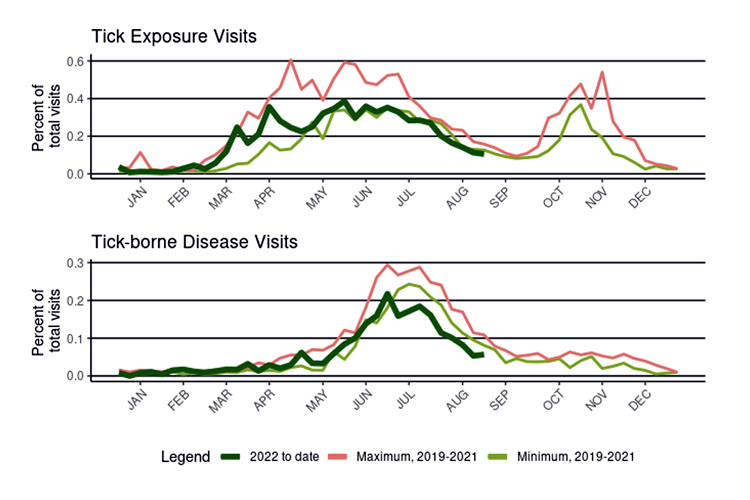To avoid tick bites, stay away from forested areas or be equipped to deal with them.
Unfortunately, ticks are showing up in places previously deemed safe from the disease-carrying arachnids, from our coastal beach areas to manicured lawns. As their population increases, the sheer number of ticks may be forcing them to branch out into new habitats this autumn, like your landscape, especially if you have an abundance of tall grasses and leaf debris.

Each year, about 30,000 cases of Lyme disease are reported to the CDC by state health departments.
The Massachusetts Department of Public Health’s (MDPH) Syndromic Surveillance program electronically collects limited information on patient visits to hospital emergency departments (ED) across the Commonwealth.
The reported data allows the Department to track trends for certain types of ED visits. This report provides monthly updates on two visit types, tick exposures, where a patient reports an exposure to ticks, and tick-borne disease, where the patient is discharged with a diagnosis of a tick-borne disease.
Also read: Are ticks more dangerous than fleas?
Because not everyone exposed to ticks or with a tick-borne disease will be seen in an ED, this data does not show all patients with tick-borne diseases in Massachusetts. More information about tick-borne diseases and how to prevent them is available at www.mass.gov/dph/tick.
Tick Exposure Visits and Tick-Borne Disease Visits
The graphs shows that in August of 2022, less than 0.3% of visits to EDs in any week were related to exposure to ticks, while less than 0.2% of visits to EDs in any week were related to diagnosis of a tick-borne disease.

The 2022 data are shown compared to both the minimum and the maximum number of visits recorded over the last three years. While tick activity usually increases in Spring and early Summer and then again in the Fall, exact timing is dependent on weather.
Tick-Borne Diseases in Central Mass
Ticks are bugs that feed on the blood of mammals, birds, or reptiles. Black-legged deer ticks and dog ticks are found throughout Massachusetts and may spread different disease-causing germs when they bite you.
In addition to Lyme disease, the most common tick-borne diseases here are Babesiosis, and Anaplasmosis. Other diseases that are more rare, but still occur, are Tularemia, Rocky Mountain spotted fever, Borrelia miyamotoi, and Powassan virus.
Tick-borne illnesses can be very severe, avoiding ticks is essential.
One of the most important things you can do is check yourself for ticks once a day when outdoors. Remember to check your children and pets, too. Remove any attached ticks as soon as possible. Check yourself, your children and your pets for ticks especially in these areas after coming inside:
- Inside and behind the ears
- Along your hairline
- Back of your neck
- Armpits
- Groin
- Legs
- Behind your knees
- Between your toes
When going outside to an area likely to have ticks:
- Stick to main pathways and the center of trails when hiking.
- Wear a light-colored, long-sleeved shirt with long pants and tuck your pants into your socks.
- This may be difficult to do when the weather is hot, but it will help keep ticks away from your skin and make it easier to spot a tick on your clothing.
- Use bug repellents. Repellents that contain DEET can be used on your exposed skin. Permethrin is a product that can be used on your clothes. Always follow the product instructions and use repellents with no more than 30-35% DEET on adults and 10-15% DEET on children. Never use insect repellents on infants.
 Prevention is everything for avoiding ticks and the potential for disease. Enlist professional Framingham tick control.
Prevention is everything for avoiding ticks and the potential for disease. Enlist professional Framingham tick control.
When back at home, ensure that your exterior landscape remains free from ticks by subscribing to a tick control regimen of a regularly applied barrier spray and tick tubes.